


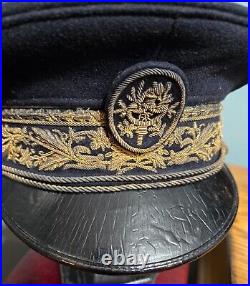


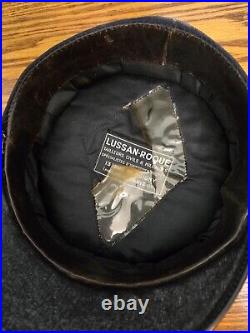


A scarce 1930s vintage French diplomat’s visor cap, in black wool. Manufactured by Lussan-Roque, Paris. Of interest to military medal and uniform collectors. See other listings for another civil French hat.



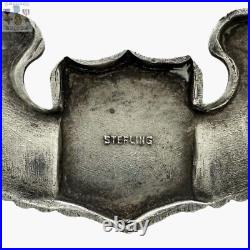

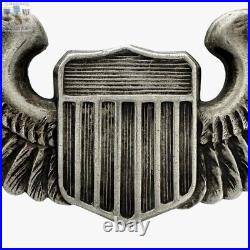






ORIGINAL 1930’S UNITED STATES ARMY AIR CORPS PILOT WINGS, 3-1/16 INCH SIZE, PIN-BACK. During World War II, with the rise of the Army Air Forces, a second series of aviator badges were issued to include a design that has survived to the modern day. The Pilot Badge was issued in three degrees, including Pilot, Senior Pilot, and Command Pilot. A polished silver colored version of these badges is currently used as the United States Air Force Pilot Badges. From August 1941 to November 1942, the Enlisted Aviator program was restarted. Candidates had to be at least 18, possess a high school diploma, and have graduated at the top of their high school class. Graduates were rated as Flight Staff Sergeants or Flight Technical Sergeants and wore the same pilot’s wings as officers. They were usually assigned to pilots of transport and auxiliary aircraft to free officer pilots to pilot the more prestigious fighters and bombers. Auxiliary pilots received their own special wings to indicate their status and specialty. In November 1942 all enlisted pilots were promoted to Flight Officer rank and enlisted cadets were graded as Flight Officers or Second Lieutenants depending on merit. Please let me know if there’s anything else I can do for you!












If you need some time to pay, please inform me and we’ll come to a deal. Please ask before you pay. Size ca 56 cm measured. Original 1930’s Brazilian sun helmet in good condition. The outside bowl was repainted in the original shade you see on the visors. The small crest is made of leather. See the pictures as they are part of the description and see my other ads as well please. Originaler brasilianischer Sonnenhelm aus den 1930er Jahren in gutem Zustand. Die Außenschale wurde in dem Originalton neu lackiert, den Sie auf den Visieren sehen. Das kleine Wappen ist aus Leder. Sehen Sie sich die Bilder an, da sie Teil der Beschreibung sind, und sehen Sie sich bitte auch meine anderen Angebote an. Capacete de sol brasileiro original dos anos 1930 em boas condições. A tigela externa foi repintada no tom original que você vê nas viseiras. O pequeno brasão é feito de couro. Veja as fotos, pois elas fazem parte da descrição, e veja meus outros anúncios também, por favor. Casque de soleil brésilien original des années 1930 en bon état. La coque extérieure a été repeinte dans la teinte d’origine que vous voyez sur les visières. Le petit écusson est en cuir. Voir les photos car elles font partie de la description et voir également mes autres annonces s’il vous plaît. Casco solar brasileño original de los años 30 en buen estado. El exterior se volvió a pintar en el tono original que se ve en las viseras. El pequeño escudo está hecho de cuero. Vea las imágenes, ya que son parte de la descripción y también mis otros anuncios. Casco da sole brasiliano originale degli anni’30 in buone condizioni. La calotta esterna è stata ridipinta nella tonalità originale che vedi sulle visiere. La piccola cresta è in pelle. Guarda le foto perché fanno parte della descrizione e dai un’occhiata anche ai miei altri annunci. ????????????????????????????????????????????????????? . ????????????????????????????????????????????????????????? . ??????????????????????? . No translation until Russia stops the war it started against democratic Ukraine.




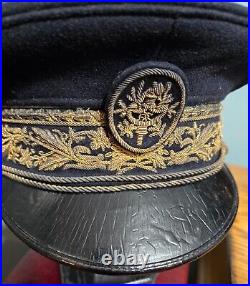


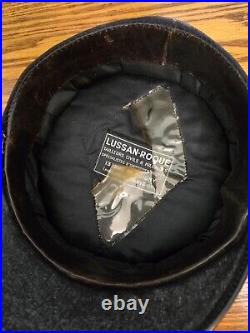


A scarce 1930s vintage French diplomat’s visor cap, in black wool. Manufactured by Lussan-Roque, Paris. Of interest to military medal and uniform collectors. See other listings for another civil French hat.


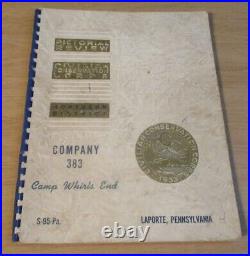

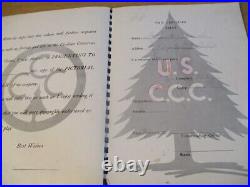
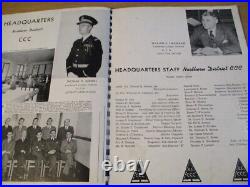
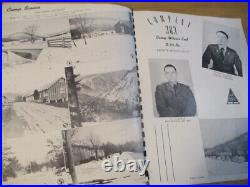
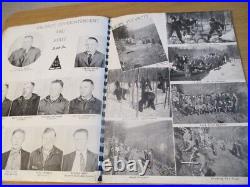

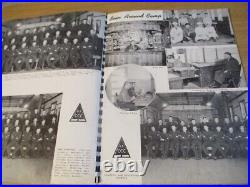
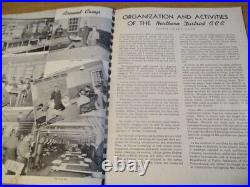
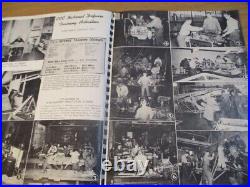
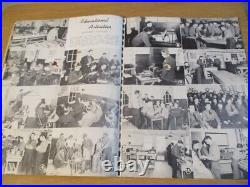
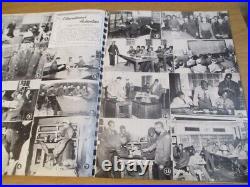
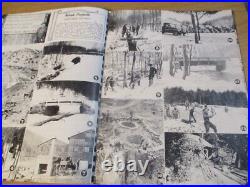
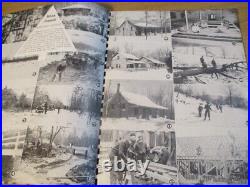








A WONDERFUL piece of MILITARY HISTORY… 8 1/2″ x 11″ with all pages shown in my photos; 26 glossy paper pages showing the camp and 8 scrapbook type pages missing everything… RARE 1930’s PICTORIAL REVIEWCivilian CONSERVATION CorpsCo #383 Whirls EndPENN.












ORIGINAL 1930’S UNITED STATES ARMY AIR CORPS PILOT WINGS, 2-13/16 INCH SIZE, PIN-BACK. During World War II, with the rise of the Army Air Forces, a second series of aviator badges were issued to include a design that has survived to the modern day. The Pilot Badge was issued in three degrees, including Pilot, Senior Pilot, and Command Pilot. A polished silver colored version of these badges is currently used as the United States Air Force Pilot Badges. From August 1941 to November 1942, the Enlisted Aviator program was restarted. Candidates had to be at least 18, possess a high school diploma, and have graduated at the top of their high school class. Graduates were rated as Flight Staff Sergeants or Flight Technical Sergeants and wore the same pilot’s wings as officers. They were usually assigned to pilots of transport and auxiliary aircraft to free officer pilots to pilot the more prestigious fighters and bombers. Auxiliary pilots received their own special wings to indicate their status and specialty. In November 1942 all enlisted pilots were promoted to Flight Officer rank and enlisted cadets were graded as Flight Officers or Second Lieutenants depending on merit. Please let me know if there’s anything else I can do for you!


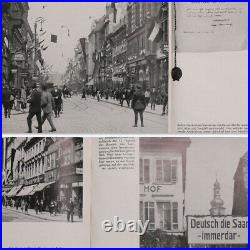

The sub title translates. Fate of a German landscape. The Territory of the Saar Basin was a region of Germany occupied and governed by the United Kingdom and France from 1920 to 1935 under a League of Nations mandate. Germany re-integrated the region into the German Reich, appointing Josef Bürckel as Reichskommissar für die Rückgliederung des Saarlandes, Reich Commissioner for the reincorporation of the Saarland. Many photos of the German towns and countryside of the region of that time. This is a very awesome and RARE photobook! Hardcover, Cloth / Full Linen. 334 pages – about 350 photo prints and illustrations – This example is from the First Edition with only 20,000 copies. Good exterior and good interior. Foxing to boards, endpapers and occasionally to pages (minor). Gift inscription on fly leaf, otherwise ok. All pages are complete and tight in the binding. Approx/Measurements: 9-3/4″ x 10-1/4″ 3 lbs. Published by History House.









ORIGINAL 1937 PATTERN UNITED STATES MARINE CORPS OFFICER EAGLE GLOBE ANCHOR HAT/CAP INSIGNIA, SCREW-BACK. “H-H IMPERIAL” (HILBORN HAMBURGER). The Globe-and-Anchor Cap Device is worn on the cap of the Marine Corps dress uniform. The globe on the U. Marine emblem signifies continuing historical service in any part of the world. The eagle represents the United States. The anchor, which dates back to the founding of the Corps in 1775, acknowledges the naval tradition of the Marines and their continual service under the command of the Department of the Navy. Please let me know if there’s anything else I can do for you!








ORIGINAL 1930’S UNITED STATES MARINE CORPS ENLISTED EAGLE GLOBE ANCHOR HAT/CAP INSIGNIA, SCREW-BACK. The Globe-and-Anchor Cap Device is worn on the cap of the Marine Corps dress uniform. The globe on the U. Marine emblem signifies continuing historical service in any part of the world. The eagle represents the United States. The anchor, which dates back to the founding of the Corps in 1775, acknowledges the naval tradition of the Marines and their continual service under the command of the Department of the Navy. Please let me know if there’s anything else I can do for you!




Profusely illustrated Book about Silesia. I’m not aware of any other more comprehensive book from that time about Schlesien! There are hundreds of photos, charts and illustrations in this book. Hardcover in Full Linen / Cloth. 400+ rare b&w photos. Many maps, charts and illustrations throughout. Fine exterior and fine interior. Former owners stamp on front free endpaper, otherwise ok. The best copy I ever had of this rare book. All pages are complete and tight in the binding. Approx/Measurements: 10″ x 10-1/4″ 3.8 lbs. Published by Folk House. Table of contents [excerpt]. Country and people – The Silesian landscape with 19 maps – The language of the Upper Silesian. Silesia in German History – The Silesian area – The prehistory of Silesia – The German face of Silesia – The territorial development of Silesia since. Silesia in the Third Reich Silesian work – People and economy in the Silesian area – Silesian Workers – The situation of the Silesian agriculture – Silesian History – Important Silesian. Silesia became part of the German Empire when Germany was unified in 1871. There was considerable industrialization in Upper Silesia, and many people moved there at that time. The majority of the population of Lower Silesia was German-speaking and Lutheran, including the capital Wroclaw, then known as Breslau. There were areas such as the District of Opole and parts of Upper Silesia, however, where a larger portion or even majority of the population was Polish-speaking and Roman Catholic. In Silesia as a whole, Poles comprised about 30%25 of the population. The Kulturkampf set Catholics in opposition to the government and sparked a Polish revival in the province. First conference of Hovevei Zion groups in Kattowitz, Silesia 1884. After the defeat of the German Empire and Austria-Hungary in World War I the German and Austrian parts of Silesia were divided between Poland and Czechoslovakia. In the Treaty of Versailles, it was decided that the population of the German Upper Silesia should hold a plebiscite in order to determine the future of the province, with the exception of a 333 km² area around Hlucín, which was granted to Czechoslovakia in 1920 despite having a German majority. The plebiscite, organised by the League of Nations, was held in 1921. The outcome was 706,000 votes for Germany and 479,000 for Poland. In the southeastern areas that were the backbone of the economy and industry, there was a strong majority for Poland. Between the wars After the referendum, there were three Silesian Insurrections, instigated by Polish nationalists, as a result of which the League of Nations decided that the province should be split again and that the areas that had voted for Poland should become an autonomous area within Poland, organised as the Silesian Voivodship (Wojewodztwo Slaskie). One of the central political figures that drive for these changes was Wojciech Korfanty. First Silesian Uprising: 16 August-26 August 1919 Second Silesian Uprising: 19 August-25 August 1920 Third Silesian Uprising: 2 May-5 July 1921. The major part of Silesia, remaining with Germany, was then reorganised into the two Prussian provinces of Upper Silesia and Lower Silesia. In October of 1938, Cieszyn Silesia (the disputed area west of the Olza river, also called Zaolzie – 906 km² with 258,000 inhabitants), was retaken by Poland from Czechoslovakia, in accord with the Munich Agreement that annihilated Czechoslovakia. Germany again took possession of these parts of Silesia in 1939, when the attack on Poland marked the beginning of the Second World War.























































































